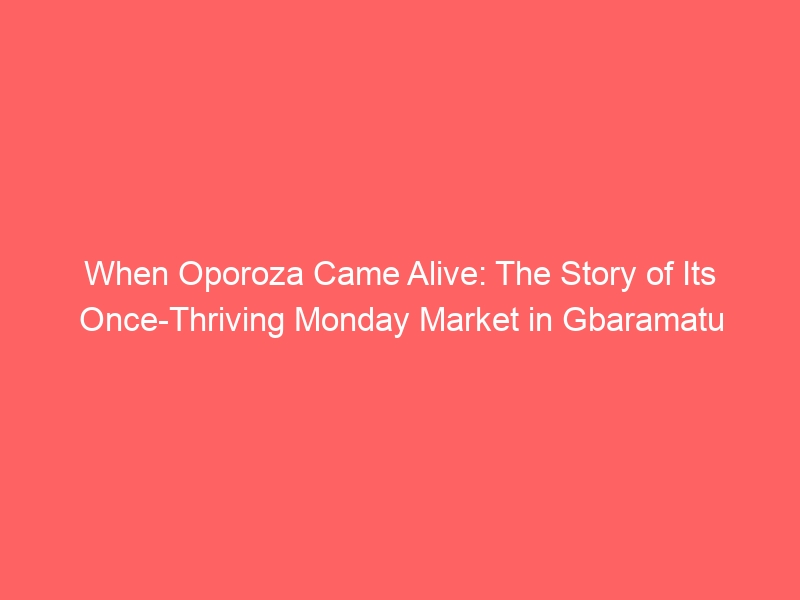By Jacob Brakere Abai
Growing up in the ancient town of Oporoza, the headquarters of the Gbaramatu Kingdom in Warri South West Local Government Area of Delta State, one could not help but be enveloped in the lively atmosphere of the Monday market. From the 1950s through the 1990s, this market was a vital hub for trade and social interaction, attracting thousands of people from neighboring Itsekiri and Urhobo communities. The market was a thriving center of commerce and cultural exchange, a place where the lines of barter trade blurred as goods and stories were shared.
Every Monday, the entire Gbaramatu Kingdom awaited Market Day with great anticipation. It was a day when communities came alive with excitement, eager for the bustling trade and the opportunity to connect with others.
As a young boy born in the 1980s, my memories of the Oporoza Monday market are vivid and cherished. The Urhobos would journey from Sapele and other communities, bringing with them an abundance of foodstuffs. Similarly, the Itsekiris would travel from Ogidigben and their other communities, contributing to the diverse array of goods available at the market. Stalls would be laden with fresh produce, dried fish, palm oil, yams, and other essentials. The air was thick with the scents of spices and the sounds of bartering, as traders and buyers negotiated in a dance as old as time itself. My family and I would often go to the market with fishes and crayfish to exchange for starch, garri, and other foodstuffs. This was the essence of trade by barter, a system that, despite the advent of currency, retained its charm and practicality in our community.
The market was not just a place for economic activity but also a social melting pot. Itsekiri, Urhobo, and Ijaw people mingled freely, exchanging not just goods but also cultural practices and stories. It was a place where differences were set aside, and communal bonds were strengthened. The market was a testament to the unity and cooperation that existed among the various ethnic groups in Delta State.
One of the more enigmatic aspects of the Monday market was the belief that it attracted not just the living but also the spirits of the dead. This was a commonly held assumption, though never confirmed, that added an aura of mystique to the bustling activity. Stories circulated about ghostly figures blending in with the crowds, drawn by the lively energy of the market day. While these tales were part of the folklore, they added to the unique charm and intrigue of the market.
The decline of the Oporoza Monday market is a story of changing times. As the decades passed, modernity and economic shifts led to a gradual waning of the thriving trade hub. The introduction of cash-based transactions and the migration of younger generations to urban centers contributed to its fading prominence. The market that once attracted thousands and buzzed with life now stands as a quiet shadow of its former self.
Today, as I reflect on those bustling market days, there is a sense of nostalgia mixed with a profound realization of the changes that have swept through our community. The Oporoza Monday market was more than just a marketplace; it was a cultural institution, a living symbol of the interconnectedness of our people. It represented a simpler time when the rhythms of life were closely tied to the cycles of nature and the bonds of community.
In light of this rich history, I urge the Speaker of the Delta State House of Assembly, Rt. Hon. Emomotimi Guwor, a son of the soil who also experienced the market in its heyday, to consider efforts to resurrect this once-booming market. Reviving the Oporoza Monday market would not only honor our heritage but also rejuvenate the local economy and strengthen community bonds.
While the physical market may have vanished, its legacy lives on in the memories of those who experienced its activity. It serves as a reminder of the importance of preserving our cultural heritage and the need to adapt to changing times while holding onto the values that define us. The spirit of the Oporoza Monday market continues to inspire, a beacon of the rich history and enduring resilience of the Gbaramatu Kingdom.
Jacob Brakere Abai is the Publisher/Editor-In-Chief of GbaramatuVoice Newspaper












